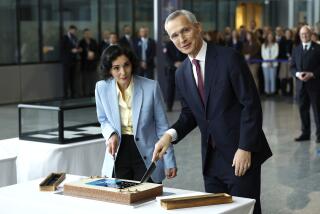NATO Agrees: Cold War’s Over, but It Cites Other Risky Areas
BRUSSELS — Closing the books on the Cold War, NATO foreign ministers agreed Tuesday that the threat of outright aggression by the Soviet Union has virtually vanished but that the West still faces dangerous risks in the Persian Gulf and from potential instability in Eastern Europe.
In a communique issued at the end of two days of meetings, the North Atlantic Treaty Organization said the alliance must maintain its military might despite its new “non-adversarial” relationship with Moscow.
At the same time, the alliance overrode strong French objections and pledged continuing consultations over the crisis in the gulf. France objected to any suggestion that the formal alliance structure might be invoked in any conflict outside NATO’s European and North American area, even though the French have sent their own forces to the gulf.
Secretary of State James A. Baker III, who clashed with French Foreign Minister Roland Dumas over the seemingly abstract point, hailed the conclusion that the gulf crisis is covered by Article 4 of the alliance’s charter, which calls for formal consultations concerning threats to allied security.
Baker said the decision recognizes “that the security of members of the alliance is threatened” by Iraq’s invasion of Kuwait.
At a press conference, Baker reaffirmed U.S. determination to use military force against Iraq after Jan. 15, even if Saddam Hussein’s regime begins to withdraw some of its forces before the U.N. Security Council-imposed deadline.
Asked specifically if the U.S.-led international force would attack if Iraq was staging a partial pullout, Baker said Security Council resolutions call for a total and immediate end to the occupation.
“I think that answers your question,” he said.
Nevertheless, U.S. officials are concerned about the potential impact on Congress, the American public and allies of an Iraqi peace ploy as the deadline approaches.
In response to a question, Baker insisted that he is satisfied with the military and economic contributions that the NATO allies have made so far to the gulf operation.
But he pointedly noted that financial contributions to the U.S.-backed military effort were solicited only for the final months of 1990. If the crisis continues--which seems certain--he said he will seek additional funds.
In their final communique, the ministers said: “The risks that allies now face in Europe arise less from a likelihood of deliberate aggression against allied territory by former adversaries than from the unforeseeable strategic consequences of instabilities that might emerge in a period of rapid political and economic transformation.
“Even in a non-adversarial relationship, prudence requires NATO to counterbalance the Soviet Union’s substantial residual military capabilities,” the statement said.
The ministers pledged to support reform in the Soviet Union and the formerly Communist states of Eastern Europe.
More to Read
Sign up for Essential California
The most important California stories and recommendations in your inbox every morning.
You may occasionally receive promotional content from the Los Angeles Times.










